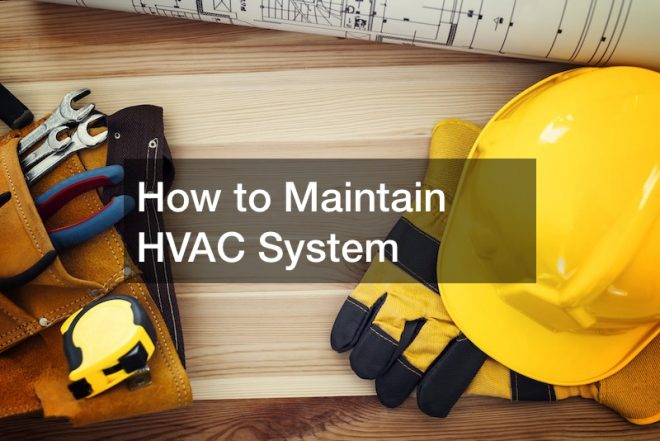
Your HVAC system is one of the most essential systems for the functionality of your home. To ensure it runs smoothly and efficiently, you must practice proper maintenance. Additionally, you’ll extend its useful life, avoid expensive repairs, and spend less on energy bills. Here are some pointers for how to maintain HVAC system.
1. Plan Routine Maintenance Inspections

Your HVAC system is just like any other piece of machinery. It needs routine maintenance from a professional to keep it in optimal working order. A qualified technician is trained to spot potential problems and do the necessary AC repairs. Most HVAC companies include routine maintenance checks in their service contracts. Neglecting these checks can result in more serious problems and costly repairs down the road. Professionals will likely spot issues that you’ll miss. The tasks that a professional will perform during routine maintenance checks include:
-
- Replacing or cleaning filters
-
- Lubricating moving components
-
- Checking the refrigerant level
-
- Inspecting the coils and condenser
-
- Listening for unusual noises
-
- Verifying that the thermostat is functioning optimally
Routine maintenance is an important step in how to maintain HVAC system.
2. Don’t Restrict Airflow To Your HVAC System
Leave enough room around your HVAC system to allow for proper airflow. Don’t place items such as plants, rugs, or furniture in front of the unit as they’ll restrict airflow. This will cause the system to work harder than it’s designed to, decreasing efficiency and increasing your energy bills. Obstructed airflow can cause the unit to overheat.
3. Maintain a Clean Environment Around Your HVAC Unit
Another important tip for how to maintain HVAC system is to ensure the area around your unit is clean and free of debris. Doing this will promote proper airflow and prevent overheating. Ensure there are no branches, leaves, or other debris outside the system.
Routinely clear any grass or dirt that gathers around the unit. At least once a year, remember to clean the exterior coil as well
4. Replace Filters Regularly
Regularly changing your air filters is one of the simplest yet most important tips on how to maintain HVAC system. A dirty filter is a recipe for disaster as it impedes airflow, causing the system to use more energy than it’s designed to, decreasing efficiency and raising your energy bills. Change your unit’s filters every few months or as recommended by the manufacturer. Note that worn-out air filters also pose a fire risk.
5. Keep An Eye On Your Energy Bills
Keeping an eye on your energy bills is a great tip for how to maintain HVAC system. It can help you better understand how efficiently your HVAC system is running. If your energy bills suddenly shoot through the roof, it’s a sign that your unit is in dire need of maintenance. It may have issues ranging from low refrigerant levels to a clogged filter. In addition to monitoring energy bills, check the performance. How long does it take to warm or cool your home? Does it cool or heat your home to your liking?
6. Check Your Home’s Insulation

Insulating your home is also a great tip for how to maintain HVAC system, as it offers energy savings. It does this by keeping your home warm in the winter and cool in the summer. When your home’s insulation is in optimal shape, the HVAC system won’t have to work as hard to maintain your desired temperature. Check if your home’s insulation needs restoration.
7. Install a Programmable Thermostat
A programmable thermostat allows you to select various temperature settings for various times of the day, translating to energy savings. For example, you can program the thermostat to lower or increase the temperature at night and lower it when you’re away from home. This will not only extend the lifespan of your HVAC system but also help you lower your energy costs.
8. Get An Yearly Tune-up
Getting an annual tune-up is one of the best tips for how to maintain HVAC system. It will keep your HVAC unit running efficiently and smoothly. Your technician will conduct a thorough inspection of your system to check for potential problems and perform repairs or replacements if necessary. They’ll ensure your system is functioning at its peak and help prevent costly repairs in the future. A yearly tune-up is more comprehensive than routine maintenance. It involves:
-
- A comprehensive inspection of your HVAC system
-
- Cleaning and adjusting equipment
-
- Lubricating all moving parts
-
- Checking the refrigerant level
-
- Running tests on safety and ignition controls
-
- Replacing furnace filters
During the yearly tune-up, your technician will check on your system’s heater oils and let you know if it’s time to schedule heating oil delivery. You can ask them for recommendations on the best home heating oil companies.
9. Learn More About Your HVAC System
Learning more about your HVAC system is another invaluable tip for how to maintain HVAC system. The more you educate yourself on your home’s HVAC system, the better you’ll be at keeping up with its maintenance needs and diagnosing the need for HVAC repair. Read the owner’s manual, check the manufacturer’s website, and consult your HVAC technician in case of any questions. You’ll understand the inner workings of the system and how to keep it in tip-top shape. Familiarize yourself with the noises it makes so it’s easier for you to detect when something is off.
10. Clean Your System Regularly
Regularly clean your HVAC unit to keep it functioning optimally. Clean the inside and outside of the system, the ducts, and the vents. Use a hose for the vents and a brush or vacuum for the rest of the system. Cleaning the system makes it more efficient and prevents contaminated air from being circulated in your home, protecting your family from infections. Cleaning is a key step in how to maintain HVAC system.
11. Clean Heat Pump and Condenser
Cleaning the condenser and heat pump are important tasks when it comes to how to maintain HVAC system. Outdoor heat pumps and air conditioners get dirty over time. This causes them to work harder than they’re designed to while trying to keep your home at the desired temperature. Cleaning the heat pump and condenser lowers the risk of damage to interior parts. Clear any debris on the sides and top of your unit. Use a garden hose to clean the fins, being careful to reach all the crevices and remove all the gunk. Confirm whether your unit is level as well. The refrigerants, which are crucial to the efficient operation of your air conditioner, will be disjointed if not level. This puts your compressor and condenser at a higher risk of malfunction.
12. Check the Drainpipe and Drain Pan of Your Evaporator Coil
If you can’t locate your drain pipe, ask your service professional to show you where you can find it. One of the most common problems with HVAC systems during summer and spring is clogged drain lines. Check the drainpipe of your HVAC system and clear any obstructions caused by the mold or algae that typically accumulates there. Use a wet-dry vacuum to suction any clogged areas and bleach to help prevent formation.
13. Consider Replacing Your HVAC system
If you’ve had your HVAC system for a while now, it’s likely not as efficient as it once was. A new system will lower not only your energy bills but also your greenhouse gas emissions. Be sure to consult with a professional HVAC technician when purchasing a new system; they’ll offer valuable insights on what’s best for you. Verify each system’s star rating to get the most efficient unit for your home. You’ll also need a new system if your current one isn’t the right size.
Why HVAC Maintenance is Important
Just like a car, an HVAC system has maintenance needs. A well-maintained HVAC system will keep your home comfortable for years to come. However, HVAC preventative maintenance is essential for this longevity. Keeping up with the HVAC maintenance of your HVAC system offers, among others, the following benefits.
1. It Lowers Utility Bills
Proper maintenance of your HVAC system will keep your system in optimal working order and reduce your AC bills. A home with an efficient HVAC system and proper insulation has lower heating and cooling costs.
2. It Extends the Useful Life of Your HVAC System
When a system is well-maintained, it will function optimally for longer. Given the exorbitant costs associated with installing HVAC systems, maintaining such equipment in peak condition makes sense. HVAC maintenance also prevents expensive repairs and the need for total replacements.
3. It Improves Air Quality
Routine AC repairs and maintenance will keep your home cozy while improving the air quality. Clean filters and coils translate to better respiratory health for the entire household. Unmaintained HVAC systems attract dust, mold, bacteria, and other indoor air pollutants, all of which cause or exacerbate respiratory issues in occupants.
4. It Has Less Emergency Repairs
Unfortunately, even with maintenance, air conditioning units need emergency repairs once in a while. When used often, such as in the hot summer months – June through September – and the chilly winter months – December to March – well-maintained systems are less prone to malfunction. Keeping up with maintenance will take away the worry of your HVAC system failing when you need it most. It can also reveal the need for heating oil delivery.
5. Improves Efficiency
An HVAC system with higher efficiency uses less energy. For the same amount of cooling or heating, dirty or poorly kept systems need 20% more energy than well-maintained AC units.
6. HVAC Unit Replacement Costs
Failing to keep up with monthly HVAC maintenance will result in a higher probability of a system failure. This may mean replacing the heat pump, air conditioner, or furnace. Replacing a damaged unit can cost you anywhere from $6,000 to $12,000 (excluding labor charges). Even if you’re lucky to only need repairs, they can be expensive. According to HVAC.com, the average HVAC repair costs are as follows:
-
- Blower motor replacement cost: $450
-
- Blower motor repair: $150
-
- Replacement thermostat: $50 to $200
-
- Ignitor replacement: $300 to $400
-
- Flame sensor replacement: $250
-
- Flame sensor repair: $80
-
- Heat exchanger replacement: $500 to $1200
-
- Heat exchanger repair: $100
-
- Pressure sensor or circuit board repair: $50
-
- Gas valve replacement: $150
-
- Circuit board and pressure sensor replacement: $350
-
- Draft inducer replacement: $150 to $450
-
- Smart valve replacement: $750
Note that these prices are averages. Your actual expenses may vary based on the type and age of your system.
Common HVAC Issues

As previously stated, your HVAC system is susceptible to a wide range of issues, some more frequent than others. Understanding these issues can be helpful. The following three HVAC issues should be on your radar as you plan your maintenance schedule and your options.
1. Corrosion
Corrosion is a possibility anywhere moisture and wiring are present. Your HVAC system can become corroded by wires or terminals, which will often result in your heating or cooling system turning on and off by itself. Like leaks, it will make your system work harder and may eventually result in a total breakdown.
2. Leaks
All connections and drain lines of your HVAC system can develop leaks. Leaks cause your system to work harder than it should, increasing the frequency of replacements. Watch out for leaks from the heat exchanger, the AC condensate line, and the refrigerant lines.
3. Dirt and Debris
From the electric panel, filter, and everything in between, your HVAC system’s components should be free of debris. Apart from lowering your unit’s efficiency, dirty air filters push dust and other allergens into the home, which lowers the air quality. They may potentially clog up the system as well.
Hiring a licensed professional to come in twice a year for preventative maintenance is perhaps the most important step in how to maintain HVAC system. This typically includes assessing furnace performance, verifying the refrigerant levels in the air conditioner, checking voltage on loose wires and motors, vacuuming the blower compartments, inspecting the drain pan and drainage system, and flushing the coils. If you haven’t had maintenance done on your system for a while, it’s time to schedule one. Hopefully, all potential issues will be detected and remedied.



